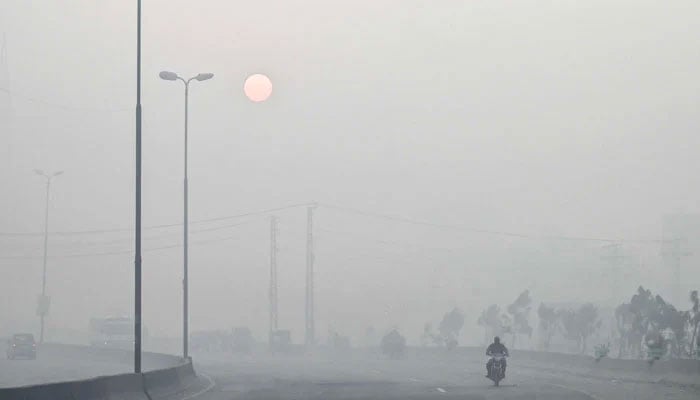Smog alert issued after Lahore air quality deteriorates
Authorities in Lahore advise residents to take precautionary measures as air quality drops to dangerously low levels
The Punjab Environment Protection Department on Sunday issued a smog alert as the province deals with rising levels of pollution, with Lahore topping the list of world's most polluted cities' list once again while colder temperatures take hold.
The average air quality index (AQI) of the provincial capital dropped abnormally in 24-hours, and was recorded at 700 this morning (Sunday), as per Swiss air quality technology company, IQAir.
According to the air quality classification by IQAir, the atmosphere becomes "hazardous" to health after the AQI crosses the 300 mark.
An AQI of 0-5 is considered "good", 51-100 is considered "moderate", 101-150 is "unhealthy for sensitive groups", 151-200 is simply "unhealthy", 201 - 300 is "very unhealthy", while more than 301 degrees indicates "hazardous".
As a result of the alarming decline in Lahore's AQI, the city has continued to rank at the top of the world's most polluted cities with a dangerously low visibility, which also indicates the worsening smog conditions in the city.
As winter approaches, Lahore is particularly vulnerable to smog, exaverbated by winds transporting polluted air from neighbouring regions, including Amritsar, New Delhi, Chandigarh at a speed of 7 kilometres per hour.
In light of the current situation, the authorities, via the alert, also urged residents to take precautions.
In the alert, authorities reminded residents to check the AQI before exercising or walking outdoors, use a mask before going to open place, keep children from playing outdoors, and avoiding traveling to heavily smoggy areas.
Meanwhile, the Lahore traffic police warned the citizens to be careful while driving motorcycles as the visibility in the city reduced to one kilometer.
Additionally, environmentalists highlighted that the air of Lahore is "very dangerous" for the citizens, calling for an environmental emergency to be enforced in the city.
They said that citizens must wear masks and avoid stepping out of homes unnecessarily. Furthermore, medical experts also warned residents of the spread of nose, eye and throat diseases as a result of hazardous air quality levels.
Smog is particularly bad in winter as a result of low-grade fuel from factories and vehicles in the low-lying megacity of 14mn, where denser cold air traps emissions at ground level.
Seasonal crop burn-off by farmers on the outskirts of the provincial capital is also a major contributing factor.
Lahore and New Delhi are mostly the most polluted cities. Today, the latter retained its position as the second most polluted city on the scale, with an AQI of 270.
Meanwhile, the third most polluted city in the world today is Cairo, the capital of Egypt, where the AQI was 159. Here, the air quality is "unhealthy" for the citizens.
Megacity Karachi ranked fourth in the list this morning as its AQI reached 162.
Bad air quality is a major threat to the health as citizens in the polluted cities develop several medical issues, especially respiratory problems.
According to a report published last year which flagged the growing burden of hazardous air on health, rising air pollution can cut life expectancy by more than five years per person in South Asia, one of the world's most polluted regions.
The Punjab authorities rush to tackle the worsening smog crisis with all arrangements made to deal hazardous levels of pollution.
The province banned outdoor school activities in Lahore would end from Monday. A Punjab School Education Department spokesperson said that the ban would last for three months until January 31.
School timings have also been changed to 8:45am, taking effect from October 28 till January 31, 2025. The school administrations have been directed to organise students' assemblies indoors.
Moreover, activities like fireworks have been banned till January, 31, 2025.
-
Security forces gun down 30 terrorists in multiple IBOs in KP: ISPR
-
MQM-P calls for new province in Sindh
-
US report validates Pakistan military edge over India: PM
-
Banned TTP poses serious threat to Pakistan security: UNSC panel
-
CM Afridi clarifies remarks on by-poll after ECP requests army deployment
-
Dubai sees 3.2m Pakistani passengers in 2025 as airport sets new milestone
-
Security forces kill 23 Indian proxy terrorists in KP's Kurram
-
Pakistan to construct island to boost oil exploration: report












